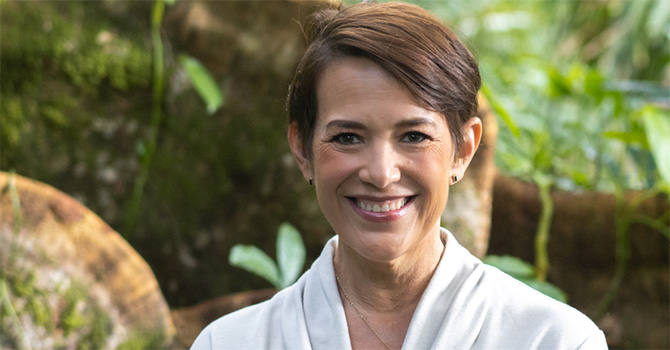A woman waits with a bag in the lobby of the Latino Community Credit Union in Durham, N.C. It’s 2000, and it’s near closing time for the credit union’s lone branch. Luis Pastor asks how he can help her. Now LCCU’s CEO, he was a volunteer at the time.
She opens the bag. It’s full of bills covered in dirt -- about $40,000 in all. She had buried her life savings in the ground. At the advice of a friend, she dug it all up and brought it to open an account at LCCU.
“In order to save this amount of money, it takes years and years,” Pastor said. “When this person decided to put all this fear and trust on us, when we were just a 6-month-old credit union, for me it was a shocking moment. She trusted us.”
She was the exception at the time. In 1999, 78 percent of Latinos in Durham County were unbanked. They all might not have been burying their money in their backyards, but they weren’t keeping it secure in checking or savings accounts.
This was a problem for Latinos, whom some criminals saw as walking ATMs. As Durham’s Latino population grew -- up more than 700 percent between 1990 and 2000, according to U.S. Census data -- crime against Latinos skyrocketed. Latinos were being assaulted, beaten, even murdered for their cash.
A frightened community mourned, showing their grief in public vigils. “One of my first ministerial acts was one of these vigils,” said the Rev. Edgardo Colón-Emeric, an assistant research professor of theology and Hispanic studies at Duke Divinity School and the treasurer and past chair of the LCCU board.
This violence against Durham’s growing Latino population prompted community and business leaders to move to create an institution that would help Latinos keep their money safe.
LCCU opened in Durham in June 2000, in an old Wachovia branch. The business plan set a goal of 500 members in the first year. After a year, LCCU had 2,500 members. Today, LCCU has 10 branches throughout North Carolina, more than 55,000 members and $100 million in assets. It’s a model for credit unions in general and for institutions serving immigrants and the poor.
Gregory Fairchild, a business professor at the University of Virginia who has studied LCCU, says he knows of no other financial institutions that started for a similar reason.
Yet Pastor doesn’t consider LCCU to be anything new. He sees LCCU as a throwback to the days when retail banking was a high-touch industry and when financial institutions offered little beyond basic investment and savings products.
“We’re very old-school,” Pastor said.
Learning how to bank
If LCCU were to be successful and sustainable, its leaders believed, members needed more than just access to checking and savings accounts and other financial products. They had to learn how to bank.
For most Latino immigrants, banks in their home countries served only the wealthy. About 97 percent of LCCU members qualify as low-income, earning 80 percent or less of the U.S. median household income.
Many come to the U.S. with no knowledge of how a bank operates. If they have had experience with loans, it's likely to have been a kind of community borrowing, where a small group pools money to lend to each other.
From the beginning, Pastor said, LCCU invested in an education curriculum to help its members learn to manage their finances. Today, LCCU teaches classes on everything from the basics of financial institutions to creating a budget and saving to getting loans for car and home purchases. Graduates of its program are feted at a ceremony that includes full academic regalia.
LCCU also has produced two feature-length educational films -- “Angelica’s Dreams” and “Roberto’s Dreams” -- which mix comedy with the dramatic telenovela style familiar to the majority of its members.
Pastor attributes the strength of the credit union’s portfolio, including a delinquency rate below 1.5 percent (the national rate was 8.44 percent in the second quarter of 2011), to its educational efforts.
“We thought that with just financial products, we are not going to move the community where we want … , to a place where they can really make smart decisions by themselves,” Pastor said.
Building bonds with diverse members
Don’t let the “Latino” in Latino Community Credit Union fool you.
Hanging from the ceiling at the LCCU headquarters in Durham are dozens of flags, each representing a member’s home nation. LCCU members represent 62 percent of the world’s nations.
The credit union has more than 2,000 members from Kenya alone. World Bank officials who contacted Pastor looking for information on providing financial services to immigrants told him that that makes LCCU the credit union with the largest African customer base in the U.S.
How does that happen? How does a credit union that was started to help keep Mexicans, Hondurans and other Latinos from getting robbed attract such diverse members?
It’s because the Kenyans, Burmese and others know that LCCU has helped immigrants become informed participants in the U.S. financial system. While employees might not know all about the Burmese culture, they understand immigrants’ struggles, because they’ve worked with them for years. Many employees are immigrants and have firsthand experience with these challenges.
“They feel comfortable,” Pastor said. “They know that we are not here to take advantage of their lack of knowledge.”
For Luis Matta, LCCU provided a link back home. He came to the U.S. from Colombia 13 years ago and settled in Charlotte, N.C., where he had family. Then, he was a journalist for local Latino newspapers looking to get money to his parents in Colombia. LCCU had the best offer, he said, and he was able to get them a debit card they could use to access his account in the U.S.
Matta, now a community relations specialist for the city of Charlotte, has been an advocate for the credit union for years, talking up its benefits in the community. “Without LCCU, the reality of this community would be very different,” Matta said.
Building these bonds with its customers is one of the crucial things LCCU has done right in its development, said Fairchild of the University of Virginia. And those bonds came from more than just hiring a bilingual teller or having printed materials in Spanish. It came through a deep understanding of new immigrants’ experience.
“A lot of the cultural intelligence that is required for reaching Latinos is also applicable to other immigrant groups,” Colón-Emeric said.
Growing with the community
LCCU has evolved and grown with the community. When the credit union started in 2000, it offered checking and savings accounts and car, personal and credit builder loans. These were the services members needed most at the time, Pastor said.
It began offering mortgages in 2004 and credit cards in 2006. Last year, it started providing microloans up to $10,000. These loans help members start a business in their kitchen or on the weekend that they can grow.
“Eventually, we will need to move this up to $25,000 and $50,000,” Pastor said. “That will happen when our community grows. We need to grow with them.”
LCCU is investing in technology as well. Just this summer, LCCU introduced computer kiosks in branches. Other financial institutions did this kind of thing a decade or longer ago. But Pastor said this slower approach allows LCCU to teach members to access their accounts online.
“[LCCU’s approach] is really empowering people. That’s at the heart of it. It’s empowering the community,” Colón-Emeric said. “Giving access to credit can allow you to buy a house, a car, start your own business. That’s been the purpose, to help people start planning and thinking more long-term instead of living on a week-to-week, paycheck-to-paycheck basis.”
LCCU also nurtures empowerment internally. Sometimes, Pastor said, there’s demand for a new branch but LCCU won’t open one until there’s someone in the organization who’s ready to run it. New employees are usually local, too; LCCU advertises job openings only on its website and on bulletin boards in its branches.
“We want one of our responsibilities to be to create a community here,” Pastor said. “If we made a decision to hire people who are already trained and capable of doing certain jobs, we’re not helping anybody to grow.”
Developing powerful partners
Other financial institutions could easily copy LCCU’s suite of basic products. It’s LCCU’s connection to the community and its patient approach to cultivating its members that’s hard to replicate.
With its loans, for example, the credit union takes a more holistic approach and considers more than just credit scores. “When you deal with refugees, when you deal with people who have been waiting for 17 years in a camp to come to the U.S.,” Pastor said, “they’re not going to default a loan.”
He said LCCU is content for members who open an account with the $10 minimum deposit to take months or even years to begin depositing money. Trust takes time, especially for people who haven’t participated in a financial system before or who come from countries where a bank might close for the day and never reopen.
Yes, this approach to member services poses a challenge for growth. LCCU could be bigger than it is. Pastor recalls a time in 2001 when the staff from the Durham branch traveled to a Catholic church in Charlotte to open accounts for new members. More than 700 people showed up, but LCCU had the time and resources to open only 150 accounts.
LCCU also has powerful partners that have provided guidance. State Employees’ Credit Union, the second-largest credit union in the nation, and Self-Help, a Durham community development organization, both were instrumental in the creation of LCCU. Today, SECU provides accounting services for LCCU. That not only has helped it fill a gap in its expertise but also has contributed to its bottom line.
“[LCCU] lowered their fixed costs by partnering with an organization that has back-office processing,” Fairchild said. “That way they could focus on what they did best, which was customer acquisition.”
Committing to a mission
At the LCCU headquarters, Pastor sits at a small, round table and talks about how he ended up there. A native of Spain, he came to North Carolina more than a decade ago with his wife, who was studying for an MBA at Duke. He had worked in banking and at a startup in Spain and heard about LCCU from a classmate of his wife’s.
Instead of returning to Spain or pursuing corporate opportunities elsewhere in the U.S., they stayed in North Carolina. Sometimes, he said, life gives you an opportunity to be part of something bigger than yourself.
Others see the opportunity, too. Individual members have come to LCCU because of its mission, as have institutional depositors, including banks, churches and universities such as Duke.
“You put the money in a deposit that is really helping,” Pastor said, “or representing the values you have, which is to treat people equally, give people opportunity, help them progress, help them have a better life.”
The need isn’t going away, said Pastor. The growth of the Latino community has slowed, but there always will be immigrants and others who will need guidance, who will need help understanding how financial institutions work, who will need a loan or a checking account as they pursue opportunity. There’s no ceiling for LCCU, Pastor said.
“Our passion is to serve low-income people,” he said. “What better moment than right now?”
Questions to consider
Questions to consider:
- What are the specific needs of the community you serve and how might you resource them?
- The Latino Community Credit Union utilizes several forms of capital in pursuing its mission. What forms of capital, other than money, can your organization draw upon?
- Are there ways you can establish trust through teaching, as the LCCU did?
- The credit union identified its weaknesses and formed partnerships in order to sustain operations. What are the weaknesses within your organization? What partnerships could you form to be sustainable?






